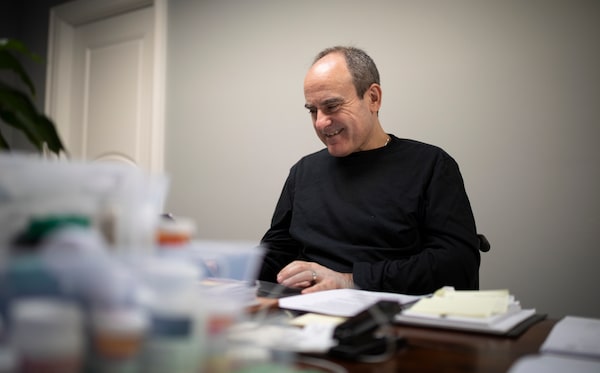
John Ruffolo joins a video meeting in his home office in Toronto on March 3, 2021.Melissa Tait/The Globe and Mail
Maverix Private Equity and Telus Corp.’s T-T venture capital arm have invested in KODE Labs, Inc., a rapidly growing property software startup whose online platform is used by more than 100 commercial landlords to manage the myriad systems inside their buildings and cut their carbon emissions.
Toronto-based Maverix led the US$30-million financing, announced Monday, into Detroit-based KODE. The startup was founded seven years ago by brothers Edi and Etrit Demaj, two refugees from Kosovo, and their long-time friend, Gentrit Gojani, the chief technology officer. I Squared Capital, which led the company’s previous financing in 2022, also invested.
KODE has experienced average annual recurring revenue growth of 200 per cent since 2021 and is on track to reach US$20-million. Clients include QuadReal Property Group and Oxford Properties, which are the real estate arms of Canadian pension giants B.C. Investment Management Corp. and Ontario Municipal Employees Retirement System (OMERS), as well as Hines, Ford Motor Co. F-N and GWL Realty Advisors. Clients use its platform to manage more than 2,000 buildings combined.
It’s the fourth investment by Maverix, led by former OMERS Ventures chief executive officer John Ruffolo, and its second in the “smart cities” space after financing traffic management technology maker Miovision Technologies Inc., which also counts Telus as an investor, in 2023.
Mr. Ruffolo said in an interview that he and fellow Maverix partner Peter Hass had looked for years to back an online software company that “could play the mediator in the middle” and make buildings “smarter” by managing heating and ventilation, elevator, water management, maintenance and other systems made by vendors such as Honeywell Johnson Controls and Schneider.
The problem was that those industrial giants closely guarded access to their application programming interfaces, meaning third-party technology companies couldn’t build tools that linked them to a common platform.
“We kind of gave up looking because those massive players would never relent,” Mr. Ruffolo said.
But market dynamics changed in recent years because of technology advances, pressure from building owners on vendors and the realization by suppliers that opening access to their software wouldn’t affect sales of physical systems, Edi Demaj said.
KODE’s founders, who previously worked in real estate, identified an opportunity to create a product that would serve as a one-stop, mobile dashboard platform that property owners could use to better control and run diagnostics on their systems and “drive operational and energy efficiency,” Mr. Demaj said.
“We wanted to make it possible to scale across thousands of buildings, at speed, at scale, and provide quantifiable return on investment while accounting for different experiences inside these buildings.”
They set out to build a platform that would be easy to use and cut costs and carbon emissions by allowing for better control of when systems switch on and off based on factors such as the weather or how many people were in the buildings.
KODE’s nearly 200 employees are split between Detroit and Kosovo, with some in London and Toronto. So far they have integrated systems from 150-plus vendors into their cloud software.
“KODE allows you to operate, optimize and proactively run your building from anywhere,” Etrit Demaj said.
Mr. Hass realized after meeting KODE’s leaders a couple of years ago that Maverix had found the type of company it had looked to back.
“We had a thesis around this space that really excites us, and these are the guys who are executing on it. In a lot of real estate portfolios, you can’t actually measure your emissions,” he said. KODE provides “a way to do it accurately in real time and at scale, which is super exciting.”
But the partners waited until KODE “got to a big enough scale” to merit investment. Maverix typically invests in companies that generate tens of millions of dollars in revenue.
Ilene Goldfine, chief digital strategy officer with Houston-based Hines, a global real estate giant with properties in 30 countries, said KODE provides more than just automated “command-and-control” software for building systems.
“It’s also about a single pane of glass, so I don’t have to go look here and here” to manage buildings’ disparate systems, she said. “This is about client experience.”
Hines rolled out the platform to about 10 properties last year and will add dozens more in 2024. Ms. Goldfine said she believes using KODE will make Hines’s buildings “more resilient and easier to sell” to prospective buyers.
 Sean Silcoff
Sean Silcoff